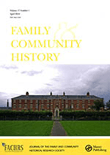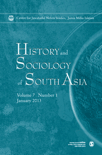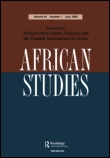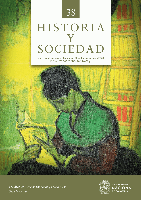
FAMILY & COMMUNITY HISTORY
Scope & Guideline
Delving into Roots: Understanding the Fabric of Family and Community History
Introduction
Aims and Scopes
- Historical Analysis of Family Units:
The journal focuses on the evolution of family structures across different periods and regions, examining how socio-economic and cultural factors influence familial relationships. - Community Histories and Social Networks:
It explores the dynamics of communities, including networks of support, dissent, and cooperation, particularly in the context of historical events like migration, industrialization, and wars. - Cultural Representations and Memory:
The journal investigates how cultural narratives and collective memories are formed within families and communities, analyzing artifacts, literature, and oral histories. - Social Issues and Historical Contexts:
There is a consistent focus on social issues such as poverty, crime, and health, contextualized within historical frameworks to understand their impact on families and communities. - Interdisciplinary Approaches:
The journal encourages methodologies from various disciplines, including sociology, anthropology, and cultural studies, to enrich the understanding of family and community histories.
Trending and Emerging
- Migration and Transnational Families:
There is an increasing focus on migration patterns and the experiences of transnational families, reflecting current global movements and their historical contexts. - Intersectionality in Family and Community Studies:
Emerging themes emphasize the intersection of race, class, gender, and sexuality within family and community histories, providing a more nuanced understanding of social dynamics. - Historical Perspectives on Mental Health and Disability:
Recent papers explore the historical treatment and representation of mental health issues and disabilities within families and communities, marking a growing interest in these often marginalized narratives. - Environmental Histories and Community Responses:
The journal is beginning to publish more on how communities have responded to environmental changes and crises, linking historical community dynamics with contemporary ecological concerns. - Digital Humanities and Family History:
The integration of digital tools and methodologies in family history research is a rising trend, enabling new ways of analyzing and presenting family narratives.
Declining or Waning
- Traditional Family Structures:
There seems to be a waning focus on traditional nuclear family structures in favor of more complex family dynamics, such as single-parent households and blended families. - Rural Community Histories:
Although rural histories remain significant, there is a noticeable decline in papers specifically dedicated to rural community studies, possibly overshadowed by urban narratives. - Victorian Social Norms and Values:
The exploration of Victorian-era family values and social norms has diminished, likely due to a shift towards more contemporary issues and broader historical contexts. - Colonial Family Histories:
Research specifically focused on colonial family experiences and structures appears to be less frequent, as attention pivots towards post-colonial studies and global histories. - Quantitative Historical Methods:
There is a reduced emphasis on quantitative analyses of family and community data, with a growing preference for qualitative narratives and case studies.
Similar Journals

Tiempos Modernos-Revista Electronica de Historia Moderna
Advancing scholarship in the realm of modern history.Tiempos Modernos - Revista Electronica de Historia Moderna is a leading open-access journal dedicated to the exploration and analysis of modern historical narratives, critical scholarship, and interdisciplinary approaches. Published by ASOC MUNDOS MODERNOS, this esteemed journal has been a vital resource for researchers, professionals, and students in the field of modern history since its inception in 2000. With its ISSN 1699-7778 and E-ISSN also 1699-7778, the journal aims to foster the dissemination of contemporary academic work and dialogues that shape our understanding of modern historical contexts. Embed your research within the broader scholarly conversation through this platform, and benefit from its commitment to open access, making academic achievements widely accessible and impactful. Located in Madrid, Spain, Tiempos Modernos stands out within the historical community by promoting innovative research and enhancing the visibility of modern historical studies.

History and Sociology of South Asia
Navigating the Cultural and Historical Depths of South AsiaHistory and Sociology of South Asia, published by SAGE Publications Inc, is a critical academic journal dedicated to exploring the intricate tapestry of historical and sociological dynamics within the South Asian context. Established in 2011, this journal provides an essential platform for scholars and researchers to disseminate their findings and engage in discourse about the region's cultural, social, and political complexities. Although it currently ranks in the fourth quartile for Cultural Studies and Sociology & Political Science, and third quartile for History, the journal offers invaluable insights that contribute to the ongoing evaluation of South Asian societal structures and historical narratives. With an HIndex currently not specified, the journal's future aims to elevate its academic influence through rigorous peer-reviewed publications. As researchers, professionals, and students delve into its pages, they will find a wealth of interdisciplinary perspectives crucial for understanding South Asia’s past and present in an increasingly globalized world.

Novye Issledovaniya Tuvy-New Research of Tuva
Showcasing Cutting-Edge Research from the Heart of TuvaNovye Issledovaniya Tuvy-New Research of Tuva is a prominent open-access journal published by CH K LAMAZHAA since 2009, dedicated to advancing the fields of Anthropology, Cultural Studies, and History. With an impressive Q1 ranking in these disciplines and a robust presence in the Scopus database—ranking 65th in History and achieving a 96th percentile in Anthropology—it serves as an essential platform for researchers and scholars seeking to explore and disseminate new insights regarding the diverse cultural heritage and historical context of the Tuva region in the Russian Federation. The journal is committed to providing accessible, high-quality research, ensuring that vital information reaches a wide audience without barriers. By spanning the years 2016 to 2024, Novye Issledovaniya Tuvy not only reflects contemporary developments but also contributes significantly to the global discourse on cultural identity and historical narratives.

AFRICAN STUDIES
Unveiling the Rich Tapestry of African ScholarshipAFRICAN STUDIES, published by Routledge Journals, Taylor & Francis Ltd, is a leading academic journal that has been at the forefront of African research since its inception in 1942. With an impressive convergence of interdisciplinary insights covering Anthropology, Cultural Studies, History, and Political Science, this journal serves as an essential resource for scholars and practitioners alike. It boasts a notable impact within its field, ranking in the Q1 quartile for Cultural Studies and History and achieving a commendable Q2 for Anthropology, and Political Science and International Relations according to the 2023 category quartiles. Researchers can benefit from the journal's rigorous peer-review process, which ensures high-quality and impactful research dissemination. While it is not an open-access journal, it offers various subscription options for accessing its wealth of scholarly articles. With a commitment to advancing understanding of African contexts and perspectives, AFRICAN STUDIES plays a crucial role in shaping contemporary debates and fostering intellectual engagement within the academic community.

Historia y Sociedad
Unveiling the Threads Connecting Past and PresentHistoria y Sociedad is a prominent open-access journal dedicated to the interdisciplinary study of history and society, published by the National University of Colombia's Faculty of Human Sciences. Launched in 2011, it aims to promote scholarly dialogue and research dissemination within the fields of historical analysis, social theory, and cultural studies. With its inclusive approach, the journal invites contributions that engage with both contemporary and historical issues, encouraging submissions from researchers, professionals, and students alike. Addressed to an international audience, Historia y Sociedad operates from its headquarters in Bogotá, Colombia, and enjoys a growing reputation for its relevant scholarship. The journal's commitment to open access reflects its dedication to making research widely available, fostering a more comprehensive understanding of societal dynamics across various contexts. Explore the rich tapestry of history and its impact on today's world through the lens of Historia y Sociedad.

PACIFIC HISTORICAL REVIEW
Charting New Territories in Pacific Historical ResearchPACIFIC HISTORICAL REVIEW, published by the University of California Press, serves as a pivotal academic journal in the field of History. With a robust ISSN of 0030-8684, this journal has been dedicated to examining the intricate narratives and themes of the Pacific region since its inception in 1967. Recognized for its scholarly contributions, it holds a commendable Q3 ranking in the History category for 2023 and is positioned in the 58th percentile among its peers in the Scopus database. The journal offers a platform for rigorous research and interdisciplinary dialogue, aiming to illuminate the diverse historical experiences and cultural complexities of the Pacific. While it does not provide open access, it remains an esteemed publication for researchers, professionals, and students seeking in-depth analyses and scholarly discourse in the rich tapestry of Pacific history.

Vestnik Tomskogo Gosudarstvennogo Universiteta Istoriya-Tomsk State University Journal of History
Unveiling the Narratives of the PastVestnik Tomskogo Gosudarstvennogo Universiteta Istoriya - Tomsk State University Journal of History is a prominent academic journal that focuses on advancing the field of historical studies with a particular emphasis on Russian and Siberian historiography. Published by TOMSK STATE UNIVERSITY, this journal aims to provide a platform for the dissemination of innovative research, critical analyses, and scholarly discussions among historians, researchers, and students. With its ISSN 1998-8613 and E-ISSN 2311-2387, the journal is committed to fostering an accessible scholarly community, although it currently does not operate under an Open Access model. By featuring works that engage with various narratives and methodologies, Vestnik Tomskogo Gosudarstvennogo Universiteta Istoriya plays a vital role in enriching academic dialogue and contributing to the ever-evolving understanding of historical contexts, particularly in relation to regional studies. This journal is an essential resource for anyone interested in delving into the complexities of history, culture, and society.

Tuna-Ajalookultuuri Ajakiri
Fostering Dialogue in History and Library SciencesTuna-Ajalookultuuri Ajakiri, published by RAHVUSARHIV-NATL ARCH ESTONIA, is a prominent Estonian journal focusing on History and Library and Information Sciences. With an ISSN of 1406-4030, this journal aims to disseminate valuable insights and scholarly research that contributes to the understanding of cultural history and information management practices, particularly within the Estonian context. Despite its recent classification in the Q4 quartile for both domains in 2023, it serves as a crucial platform for emerging scholars and seasoned researchers alike, fostering dialogue and collaboration in its fields. Covering publications from 2011-2014 and then resuming from 2017-2022, the journal seeks to bridge gaps in historical narratives and enhance the academic discourse surrounding library sciences. While it currently does not offer an open access model, it remains a key reference point for those pursuing in-depth studies in these crucial areas of academia.

Memoria y Civilizacion-Anuario de Historia
Connecting Scholars Through Open Access HistoryMemoria y Civilizacion-Anuario de Historia, published by UNIV NAVARRA, SERVICIO PUBLICACIONES, is a prestigious open-access journal that has been serving the academic community since 1998. With a focus on historical research, this journal contributes significantly to the field by offering a platform for scholars to disseminate their findings and engage in critical discussions. With its Q1 ranking in History for 2023 and a solid position in the Scopus listings (Rank #905/1760), it underscores its importance in the humanities, ensuring that quality research reaches a wide audience. The journal is based in Spain and is committed to open access, providing free availability of its content to promote wider dissemination of knowledge. Researchers, professionals, and students alike will find Memoria y Civilizacion-Anuario de Historia to be an indispensable resource for historical inquiry and scholarship.

Anos 90
Exploring the Cultural Tapestry of Brazil's 90s.Anos 90 is a distinguished journal dedicated to the exploration of historical narratives and cultural phenomena, particularly within the context of Brazil during the tumultuous decade of the 1990s. Published by the Universidade Federal do Rio Grande do Sul as part of its Programa de Pós-Graduação em História, this open access journal has been a vital platform for scholars since 1993, encouraging the dissemination and discussion of historical research that contributes to the understanding of contemporary societal evolution. With an ISSN of 1983-201X and an E-ISSN of 0104-236X, the journal is committed to providing accessible scholarly content to a global audience, thus fostering collaborative research opportunities and academic dialogue. Despite being ranked in the fourth quartile for the History category as of 2023, Anos 90 remains an essential resource for researchers and students seeking in-depth insights into historical interpretation and analysis. The journal serves as a critical juncture for the academic community interested in delving into the complexities of a pivotal era in Brazilian history, making it a significant addition to the field of historical study.